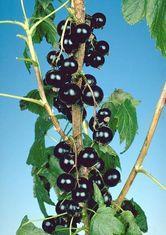
Blackcurrants come top of the superfruit health league, according to the first science-based review of 20 fruits commonly credited with helping fight disease.
Based on data collated by Scottish Crop Research Institute (SCRI), and prompted by the media frenzy surrounding exotic “miracle” newcomers, the analysis uncovers an impressive dossier of medical evidence to support blackcurrants’ claims, while the same cannot be said for headline huggers, such as the goji.
SCRI’s Dr Derek Stewart said: “I trawled the literature for scientific and medical studies, looking at whole fruits and extracts, for diseases and disease models. I also looked at compositional data on energy, fibre, protein, and range of vitamins and minerals and what 100g of fruit represents as part of the RDA. For some of them there are no studies at all.
“There’s no evidence on goji berries, because what they are basing claims on is anecdotal or traditional usage. That doesn’t mean they are not any good, but they don’t make it on to the list.”
The table, which includes other commonly consumed fruits in Britain, such as citrus, melons, bananas and avocado, is bound to cause controversy but Stewart stressed it wasn’t a case of British producers getting their own back, despite the “waffle” talked about many imported varieties.
“You cannot compare a blackcurrant with a banana, for example. Blackcurrants are good, but they’re not gong to be the single fruit people eat every day. 100g of dates give you 50 per cent of your energy needs, but no-one’s going to eat 200g of them.”
Stewart hopes the table will stimulate the fruit industry to “get its act together”.
“It’s a living document. As things come in we will see the rankings changing,” he said. “Blackcurrants could well go down.”
Meanwhile, it’s given a boost to growers who are keen to find new processing markets for the fruit.
“Blackcurrants are not as sexy and they suffer from the fact that the bulk of them are consumed as juice, but if you rank them according to a range of different criteria, they come out number one in most,” said Kent grower John Hinchliff, who sits on the board of the Blackcurrant Foundation, which will publish the report. “We want to convince other processors that they should be using British blackcurrants.”



